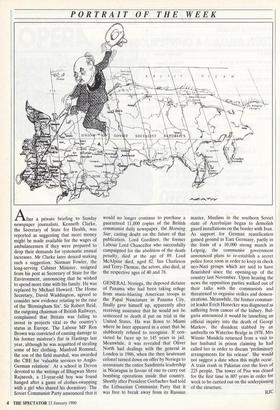PORTRAIT OF THE WEEK
After a private briefing to Sunday newspaper journalists, Kenneth Clarke, the Secretary of State for Health, was reported as suggesting that more money might be made available for the wages of ambulancemen if they were prepared to drop their demands for systematic annual increases. Mr Clarke later denied making such a suggestion. Norman Fowler, the long-serving Cabinet Minister, resigned from his post as Secretary of State for the Environment, announcing that he wished to spend more time with his family, He was replaced by Michael Howard. The Home Secretary, David Waddington, agreed to consider new evidence relating to the case of the 'Birmingham Six'. Sir Robert Reid, the outgoing chairman of British Railways, complained that Britain was failing to invest in projects vital to the country's status in Europe. The Labour MP Ron Brown was convicted of causing damage to his former mistress's flat in Hastings last year, although he was acquitted of stealing some of her clothing. Manfred Rommel, the son of the field marshal, was awarded the CBE for 'valuable services to Anglo- German relations'. At a school in Devon devoted to the writings of Bhagwan Shree Rajneesh, a 13-year-old boy was found hanged after a game of clothes-swapping with a girl who shared his dormitory. The Soviet Communist Party announced that it would no longer continue to purchase a guaranteed 11,000 copies of the British communist daily newspaper, the Morning Star, casting doubt on the future of that publication. Lord Gardiner, the former Labour Lord Chancellor who successfully campaigned for the abolition of the death penalty, died at the age of 89. Lord McAlpine died, aged 82. Ian Charleson and Terry-Thomas, the actors, also died, at the respective ages of 40 and 78.
GENERAL Noriega, the deposed dictator of Panama who had been taking refuge from music-blasting American troops in the Papal Nunciature in Panama City, finally gave himself up, apparently after receiving assurance that he would not be sentenced to death if put on trial in the United States. He was flown to Miami where he later appeared in a court that he stubbornly refused to recognise. If con- victed he faces up to 145 years in jail. Meanwhile, it was revealed that Oliver North had dealings with the general in London in 1986, when the then lieutenant colonel turned down on offer by Noriega to assassinate the entire Sandinista leadership in Nicaragua in favour of one to carry out bombing operations inside that country. Shortly after President Gorbachev had told the Lithuanian Communist Party that it was free to break away from its Russian master, Muslims in the southern Soviet state of Azerbaijan began to demolish guard installations on the border with Iran. As support for German reunification gained ground in East Germany, partly in the form of a 10,000 strong march in Leipzig, the communist government announced plans to re-establish a secret police force soon in order to keep in check neo-Nazi groups which are said to have flourished since the opening-up of the country last November. Upon hearing the news the opposition parties walked out of their talks with the communists and threatened to organise strikes and demon- strations. Meanwhile, the former commun- ist leader Erich Honecker was diagnosed as suffering from cancer of the kidney. Bul- garia announced it would be launching an official inquiry into the death of Georgi Markov, the dissident stabbed by an umbrella on Waterloo Bridge in 1978. Mrs Winnie Mandela returned from a visit to her husband in prison claiming he had called her in order to discuss 'preliminary arrangements for his release'. She would not suggest a date when this might occur. A train crash in Pakistan cost the lives of 225 people. The tower of Pisa was closed for the first time in 807 years in order for work to be carried out on the underpinning of the structure.
RJC










































 Previous page
Previous page